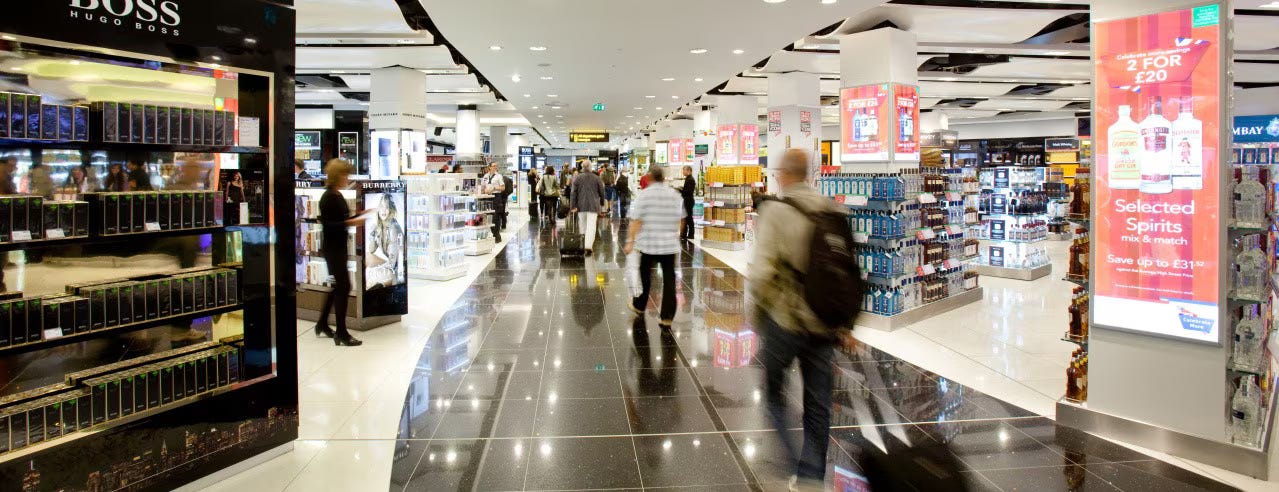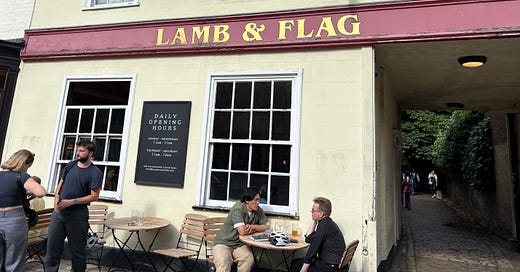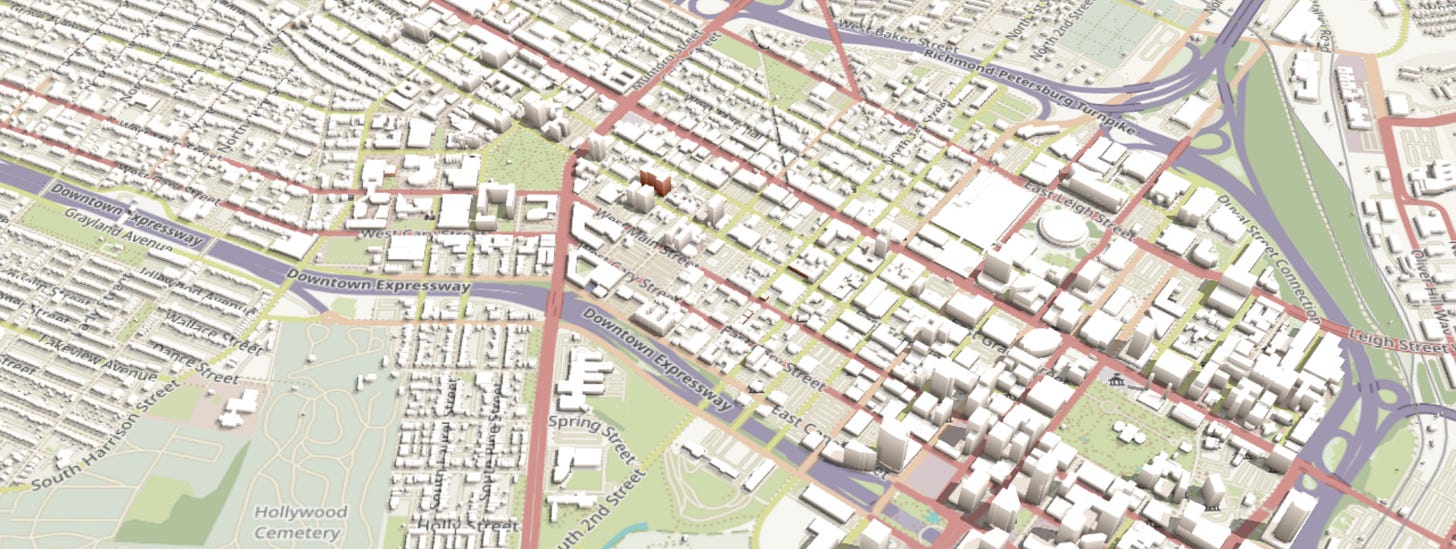It often comes as a surprise to my friends just how poorly travelled I am. This past week, I visited the UK with my family (London & Oxford) for the first time.12
Some reactions to my first time in UK3:
Fresh food
I’d long read on Tyler Cowen’s blog about how mediocre American produce is, and had tasted the difference firsthand in places like China. But experiencing it in London—an English-speaking city that otherwise feels familiar—was still a visceral shock.
The first thing I ate in London was some grape tomatoes from the Tesco beneath our Airbnb—easily among the freshest I’ve ever had. And it wasn’t just the produce. Across the board, the food quality was striking. Even random pubs or small cafés tucked inside public parks served food that had a lightness, a freshness, a sense of care in their making, that rarely exists in the U.S.
When we returned to the U.S., we grabbed a late dinner at Royal Farms and Chipotle after the flight, and it genuinely felt like re-entering a less civilized country.
Actual british cuisine? Just alright.Small observation on law & order
As tourists do, we visited Buckingham Palace to see the changing of guard. And I noticed that there were several volunteers standing around in the crowd, whose sole purpose seemed to be to hold signs saying “Beware of pickpockets - guard your valuables”.
Some carceral urbanism twitter discourse will comment on random parking garage signs that say “Don’t leave valuables in your car” as a sign of decaying rule of law.
But I thought it particularly striking that at the heart of the British Empire in Buckingham Palace, the government took the time to warn visitors it could not protect them from petty crime.London Urbanism and Supercities
Overall, London felt like the best version of an anglosphere city. Lots of beautiful old buildings and plenty of urban density and mixed use e.g. Tesco right underneath our airbnb unit
It was also funny to see where the names for almost everything in the U.S. came from e.g. Soho in London, Richmond in London, etc
In many ways, I imagine London is quite similar to Tokyo4: the supercity capitol of a small island nation. As a result, it has competing industries all agglomerated together, unlike in the U.S. where we have more specialized cities e.g. DC for policy, SF for tech/startups, Boston for biotech etc.
At least two downsides to supercities seem to be that they may not benefit as much from industry-specific agglomeration and their housing problems are much more pernicious because the latent demand is essentially the entire nations working class. I suppose everyone plays with the hand they’re dealt. More analytical urbanists should correct me in comments if this intuition feels wrong to you!More urbanism: Oxford
We took a short train ride to Oxford (again: not to be all American, but the trains were incredible) and got to see more lovely old buildings. It was interesting to learn more about the college system at Oxford, which seems quite formative for elite community building and something only the old school Ivies in the U.S. still try to replicate.I also visited the Lamb and Flag, the pub where Lewis and Tolkien would regularly hang out!
sidebar: pub culture is great - it is a third space that is relatively family friendly, open quite late, and universally recognized as a social third space. It also seems to create a healthier social culture around drinkingOne shocking fact I learned: for all of Oxford’s lovely urbanism and walkable mixed-use, it actually has a lower population density than my home town of Richmond VA, which does not have lovely urbanism, walkable mixed use, or electric double decker buses anywhere!
Much of this can be explained by the zoning. Richmond has that strict Euclidean zoning that results in “spiky” high-rise commercial downtowns adjacent to single-family houses, which makes transit planning much more difficult,whereas Oxford has more mixed-use, resulting in that even topography and which makes transit more feasible.
Still it was shocking just to viscerally see how different urban topologies can change perceptions of population density.
Misfits and UK Policy
It cannot be understated the extent to which Dominic Cummings club of misfits created a chain reaction of young, smart people coming into UK government that continues today, even under a Liberal government. Fascinating political science papers could be written about the family tree of misfits and their impact in the years to come.
Only time will tell if DOGE will have the same impact, though I am currently skeptical.
It is also funny how different public policy prescriptions end up looking in different countries. In housing and energy, the two areas I’m most familiar with, U.S. and UK policy wonks seem to have converged on entirely different solution sets. Some of this stems from divergent institutional histories (a millennium of UK bureaucracy makes building nearly impossible), and some from facing different constraints. But I also suspect that early memetic traction—what ideas caught on first—explains much of the divergence.
My best mapping of what policy wonks (at least in my corners of the internet) are thinking about in US & UK for Housing & Energy:\( \begin{array}{|c|c|c|} \hline & \textbf{UK} & \textbf{US} \\ \hline \textbf{Housing} & \text{StreetVotes} & \text{upzoning, single-stair, parking minimums} \\ \hline \textbf{Energy} & \text{CfDs} & \text{tax credits, loan programs} \\ \hline \end{array}\)Cost of living and economic malaise
My dad loves to overshare with Uber drivers. One benefit of this is that Uber drivers become comfortable sharing about their lives with us. A strong sense of economic malaise that permeated these conversations: conversations about stagnating wages, about losing jobs and moving to Uber full-time, and general pessimissim that London would ever become affordable.
It is also striking that cost of living, the food and housing costs, were basically the same as or higher than in the U.S. I didn’t feel like I was “getting a deal” by travelling to the UK - everything was just as expensive as in a major U.S. city, despite wages being much lower.Airports
I flew into London Heathrow and this was the first thing I saw getting off the plane:I flew out of London Gatwick, taking a very convenient southern railway train to get there. After clearing airport security, I walked through what felt like a never-ending corridor of around 25 duty-free shops before reaching the gates.

London Gatwick (not my picture). Basically an endless single corridor between security and airport gates of duty free stores To the extent airports are the indicators of the orientation of a country’s capitalist impulses, this might say something?
Still, I did pick up a free copy of the Financial Times weekend edition at a newsstand—so that was a plus!
All in all though, a delightful trip and I hope to spend more time there soon.
For context, I have also never travelled to any part of Europe, which might explain some of the reactions outlined here
First reactions are, by their very nature, surface-level and likely wrong in some aspects. I welcome my better travelled and British-familiar friends to correct me on any inaccurate first impressions!
I don’t think I have anything super insightful here but I am trying to improve the turnaround time for my writing and I also find writing such reactions down to be helpful in clarifying vague reactions, potentially for future reference!
which I have also never been to…







Glad you enjoyed your trip!
I also visited Oxford and London recently! It's indeed a pretty magical trip. I really liked Oxford.